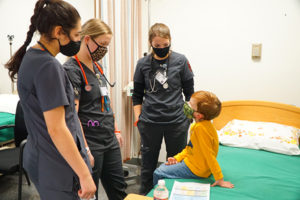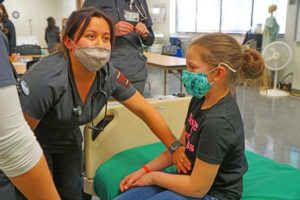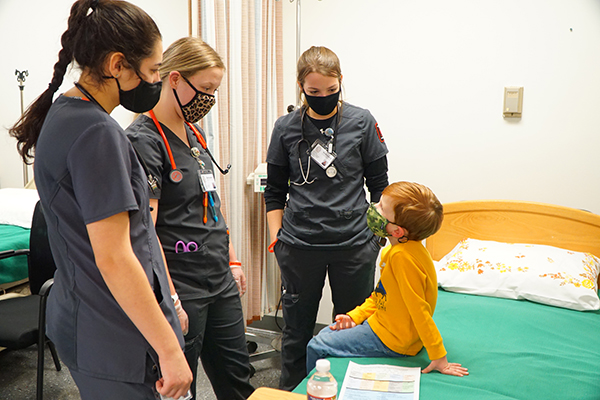By KAYLEA BROWN, Student Reporter
Students, teachers find ways to use tech in and out of the classroom
Stethoscope.
Scrubs.
Compression socks.
Coffee.
Pens.
Planner
Badge.
These are some of the essentials for nurses and nursing students alike during a normal year. But 2020 was anything but a normal year for the healthcare industry, and two other essentials were added to their lives: masks and face shields.
Since March 2020, healthcare workers have faced new challenges – some of which resulted in positive changes to the nursing department at Northwestern Oklahoma State University.
“They [students] are carrying a much larger load at home as well as with their jobs and at school,” said Dr. Leslie Collins, Charles Morton Share Trust Division of Nursing assistant chair and assistant professor of nursing.
“Our students have always had to be flexible because that’s just something that nursing requires, but it’s gone to a full other extent.”
Classes moved online, clinicals got canceled and lab exercises became a way for professors to demonstrate skills to students through videos when NWOSU went virtual last spring.
While these initial changes were difficult, the nursing department has had to make more changes this semester to allow its students to continue to learn.
Adria Lujan, a 20-year-old junior nursing major from Altus, said one of the hardest changes to deal with was in the summer of 2020 during her introduction to nursing care course. The course is typically in-person, but with the ongoing pandemic, it had to be moved online.
“I was not able to practice some of the most basic things that you learn because we couldn’t use equipment or be in person,” Lujan said . “I had to practice on stuffed animals for assessments to do specific vital signs when you can’t say that’s really doing it.”
Students used the labs and the mannequins to practice different scenarios that could be seen in the real world and during clinicals before the pandemic.
CHANGING CLINICALS
Collins said now that classes are in-person again, they have used the lab much more than they did before. Students use them on a weekly basis to practice their skills for clinicals.
In previous years, clinicals were spread out over a longer time period during the semester, and each clinical day lasted three to four hours.
“This semester, they [professors] are trying to get them done in the beginning in case our classes go online, or the hospitals don’t allow nursing students to come in,” said Carys Delaplane, a 21-year-old junior nursing major from Enid.
While clinicals have changed a lot, there have been some positive reviews about the changes from students, faculty and facilities.
“In the fall, we decided to front-load, so they actually go for 10–12 hour shifts, so that puts them traveling less amounts of time, but it’s giving them so much great experience,” Collins said . “They had a lot of really good experience before, the best experience they possibly could have, and now it’s just even better.”
Front-loading the clinicals also allows students to have time at the end of the semester to put all the information they learned from skills lab and clinicals together. It also provides an opportunity to study for the National Council Licensure Examination, which is for nurses.
NEW CARE PRACTICES
While nursing students are still able to take care of patients as they normally would, their ability to go into every patient’s room has changed.
This varies throughout hospitals because of differing coronavirus policies.
“At the hospital that I’m currently at, we aren’t allowed to take care of COVID-19 patients due to the hospitals policy, because they want to try to keep us safe,” Delaplane said.
In addition to changes being made to the skill labs and clinical, there has also been a change in regard to the way the nursing department uses technology.
Because of the pandemic, the use of telehealth platforms became more popular and widespread.
ADVENT OF TELEHEALTH
The nursing department received telehealth equipment because of a grant, Collins said. This new equipment has the potential to allow professors to show students that they have an opportunity to be a nurse through telehealth and telemedicine platforms.
Kylee Alexander, a 22-year-old senior nursing major from Enid, said the knowledge professors have about online systems is one way in which nursing students have benefitted from the pandemic.
Now if students miss class because of illness or other reasons, they are able to watch the lecture online. In addition, the professors do not have to worry about rearranging the class schedule if campus is closed.
Even though professors no longer have to worry about rearranging class for missed days, they do have to worry about how to make sure their students are going to be able to complete certain assignments, such as pediatrics day and presentations at elementary schools and middle schools in Alva.
Although getting through the last year has been a challenge for the department some of the challenges have resulted in blessings for the students, faculty and facilities, said Collins.
“We really leaned into what can we do more with students and how can we help with facilities, and it worked out to be a great blessing,” Collins said.
“We’ve all seen that limits can be pushed, but we meet them and we exceed them. As hard as it has been there’s been good from it and we found a lot of joy.”



